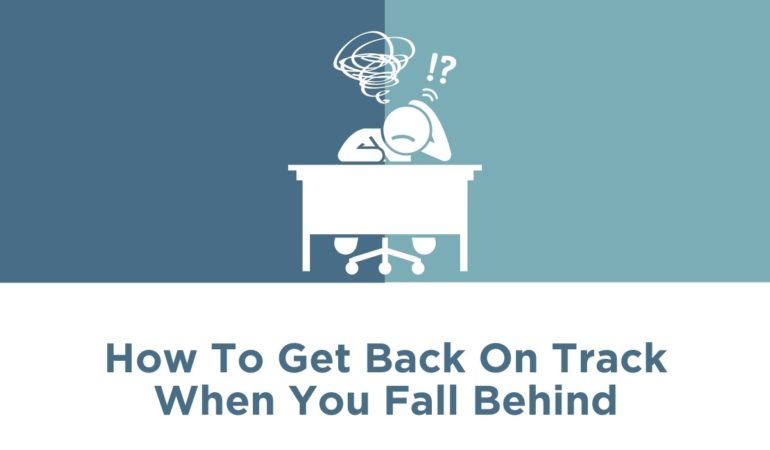How To Get Back On Track When You Fall Behind

How To Catch Up On School Work
Getting back on track in school is a daunting task. The assignments have piled up and you seemingly have to do twice as much work just to catch up. When you start to dread your school life, it’s time to ask for help.
Help can come in many forms. Some students will feel at ease just by speaking with a school counselor. Others may need to spend an entire day to evaluate and schedule work to be on track by the end of the term. Or maybe you fall somewhere else. Whatever your case is, overstressing is to be avoided.
If you have a plan and you stick to it, there should be nothing to stress about. If you’re trying to get a good grade and you’re worried you won’t get it, then it’s helpful to review your options from part 1 for what to do when you fall behind.
Getting Back On Track
-
Write down your day’s schedule hour by hour
Think of your day today and write down what will be done for each hour. You can use this to understand where your time is currently being spent.
-
Visualize your schedule
Take your day’s schedule and visualize the day. Is there any time for your studies? Try to find things in your schedule that are slowing things down. Many students will say they are too busy, but when you go through the day step-by-step, gaps will start to present themselves.
-
Put the hours in
Almost every student has time in their schedule that is not being used to its fullest extent. Find the time and devote it to schoolwork to catch up. You can use a strategy called chunking to break up your work into time-based chunks. This helps to create positive feedback loops.
Don’t prethink, just start and use a timer to work in set increments. If you have a hard time staying focused, you can start with doing 10 minutes of work followed by 10 minutes of a break. Then, slowly progress to 30min and break for 15, and eventually, 120 minutes of work followed by a 15-minute break.
-
Eliminate distractions during work
Eliminating (or ignoring) distractions takes some serious self-discipline this day in age. Preventing phone time is usually the key, though some students need to eliminate just about any distraction. If you’re struggling to focus during your set study periods, try to just sit there with your work in front of you for the entire study period. If there aren’t any distractions, then a natural curiosity will set in and you’ll find out that studying is more interesting than doing nothing.
-
Find tips and other life hacks that work for you
There are tips, tricks, and just outright common-sense things you can do to improve your ability to perform and learn. Here are a few ideas that could lead to better results in school.
Health
Drink plenty of water. This is the most important. After hydration comes nutrition. Eating balanced foods high in natural fats and omega 3’s consistently throughout the day will help prevent an energy crash. Then finally, sleep for at least 8 hours a night. This rest helps your brain develop and improves memory.
Accountability
Tell people about your goal to complete your schoolwork. Goals that are properly defined along with social pressure help us get to it and get it done.
Natural Rhythm
You may find that some times of the day (or month) are better than others for scheduling study time. Try to find your body’s time when it’s most engaged (or least distracted) and use that time as a strategic study chunk.
Eliminate Distractions
Some students leave their devices in another room, turn them on airplane mode, or use an app that disables select app access and rewards users for staying true to their distraction-free goals.
School Choice
Not all schools are created equal. When you fall behind at iLearn, we offer a few ways to catch up. As long as you’re not regularly receiving zeros on assignments, moving too slowly, or caught cheating, you may be eligible for flexibility benefits such as extensions, course holds, test redo’s and other leniencies depending on your situation. We also offer course upgrades for students who are eligible. See more on our course upgrades page.
Find Ways To Enjoy Your Learning
When a student enjoys what they are learning, remembering and spending additional time on the topic becomes easy. The key is to relate what you are learning to what you are interested in. You may not think there is any crossover between the two topics but you’d be surprised how very different knowledge sets can complement one another.
Do you have access to courses you’re interested in at your school? Check out our course catalogue to explore 150+ online course options. Already know the course you want to start? Check your eligibility to get started.

